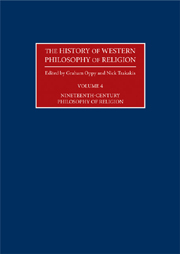Book contents
- Frontmatter
- Contents
- Editorial Introduction
- Contributors
- 1 Nineteenth-Century Philosophy of Religion: An Introduction
- 2 Johann Gottlieb Fichte
- 3 Friedrich Schleiermacher
- 4 G. W. F. Hegel
- 5 Friedrich Schelling
- 6 Arthur Schopenhauer
- 7 Auguste Comte
- 8 John Henry Newman
- 9 Ralph Waldo Emerson
- 10 Ludwig Feuerbach
- 11 John Stuart Mill
- 12 Charles Darwin
- 13 Søren Kierkegaard
- 14 Karl Marx and Friedrich Engels
- 15 Wilhelm Dilthey
- 16 Edward Caird
- 17 Charles S. Peirce
- 18 Friedrich Nietzsche
- 19 Josiah Royce
- 20 Sigmund Freud
- 21 Émile Durkheim
- Chronology
- Bibliography
- Index
8 - John Henry Newman
- Frontmatter
- Contents
- Editorial Introduction
- Contributors
- 1 Nineteenth-Century Philosophy of Religion: An Introduction
- 2 Johann Gottlieb Fichte
- 3 Friedrich Schleiermacher
- 4 G. W. F. Hegel
- 5 Friedrich Schelling
- 6 Arthur Schopenhauer
- 7 Auguste Comte
- 8 John Henry Newman
- 9 Ralph Waldo Emerson
- 10 Ludwig Feuerbach
- 11 John Stuart Mill
- 12 Charles Darwin
- 13 Søren Kierkegaard
- 14 Karl Marx and Friedrich Engels
- 15 Wilhelm Dilthey
- 16 Edward Caird
- 17 Charles S. Peirce
- 18 Friedrich Nietzsche
- 19 Josiah Royce
- 20 Sigmund Freud
- 21 Émile Durkheim
- Chronology
- Bibliography
- Index
Summary
Although Newman (1801–90) was prolific as a theologian, the philosophical justification of religious belief was always the subject that most keenly concerned him throughout his life. However, it is only in recent years that his importance as a philosopher has been acknowledged. His own philosophical background was the empiricism of John Locke and David Hume (see Vol. 3, Chs 12, 19), but his preoccupation with religious belief meant that his philosophical thought was of no interest to the British empiricist tradition. On the other hand, his empiricism set him apart from British and continental idealists who were open to religious themes. It is important to note that Newman was not an empiricist in the sense of holding a sense-data theory or in denying the possibility of synthetic a priori truths, but only in the general sense of having an empirical and open, undog-matic approach to knowledge and truth, particularly in the very Humean way of emphasizing informal over against strictly formalized logic. Indeed, his criticism of Locke was that he was not empirical enough, complaining that Locke's “view of the human mind” was “theoretical and unreal … because he consults his own ideal of how the mind ought to act, instead of interrogating human nature, as an existing thing, as it is found in the world” (Newman 1985: 109).
- Type
- Chapter
- Information
- The History of Western Philosophy of Religion , pp. 105 - 118Publisher: Acumen PublishingPrint publication year: 2009



